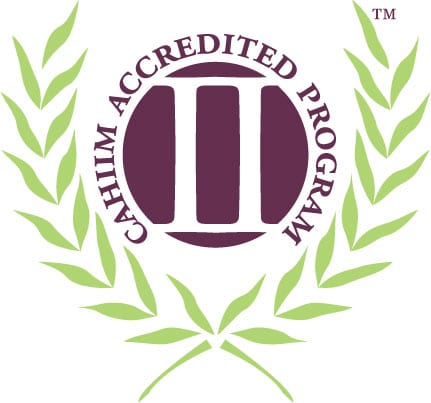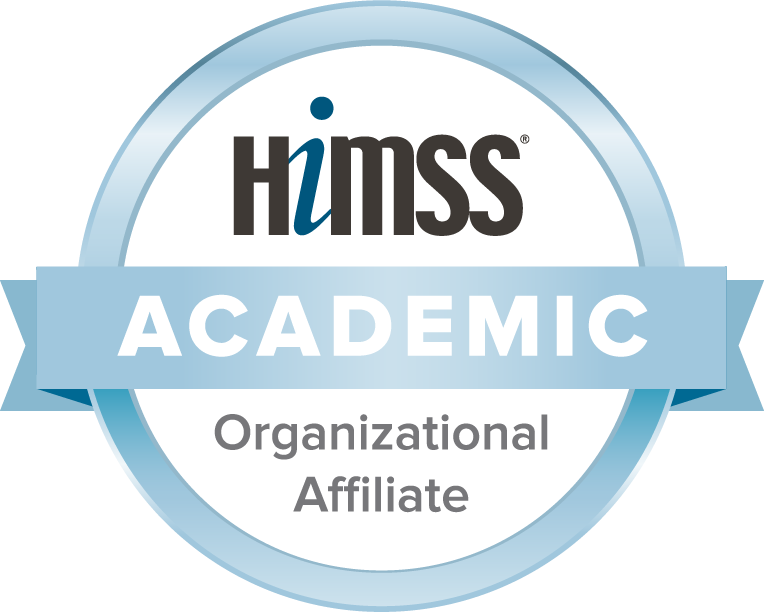
Graduates of the HIM program will have the skills and knowledge needed to manage patient data and work with electronic health records in today's healthcare environments. Our program is guided by the principle of quality healthcare through quality information.

The Health Information Management accreditor of Charter Oak State College is the Commission on Accreditation for Health Informatics and Information Management Education (CAHIIM®). The College’s accreditation for Baccalaureate degree in Health Information Management has been reaffirmed through 2031. All inquiries about the program’s accreditation status should be directed by mail to CAHIIM®, 200 East Randolph Street, Suite 5100, Chicago, IL, 60601; by phone at (312) 235-3255; or by email at info@cahiim.org.
All foundation and major requirements must be completed with a grade of 'C' or higher.
HCA 101: Health Care Systems and Administration
3 creditsHCA 105: Medical Terminology
3 credits
Note: 21 of these credits must be completed at Charter Oak, including HIM 498 & HIM 499.
All foundation and major requirements must be completed with a grade of 'C' or higher.
HIM 115: Principles of Health Information Management
3 creditsHIM 200: Health Information Systems and Databases
3 credits
or
**HIF 530 Introduction to Health Informatics and Hot TopicsHIM 205: Reimbursement Methodologies
3 creditsHIM 210: Clinical Classification Systems I
3 creditsHIM 211: Clinical Classifications Systems II
3 creditsHIM 300: Medical Vocabularies and Classification Systems
3 credits
or
**HIF 540 Health Data Vocabularies and StandardsHIM 305: Health Information Services Management and Leadership
3 creditsHIM 315: Health Statistics
3 creditsHIM 320: Electronic Health Records and Health Information Exchange
3 creditsHIM 405: Health Care Information Law, Privacy, and Security
3 creditsHIM 420: Health Care Research and Quality
3 creditsHIM 435: Health Care Data Analytics and Information Governance
3 credits
or
**HIF 535 Healthcare Data AnalyticsMGT 460: Project Management
3 credits
or
**HIF 615 Information Technology Project ManagementHIM 498: Health Information Management Practicum
3 creditsHIM 499: Health Information Management Capstone
3 credits
**These courses must be approved as part of the Fast-Track Undergraduate to Graduate Degree Program.
These courses must be completed in order to satisfy a portion of the general education requirements for this degree.
* These courses must be completed with a grade of 'C' or higher.
BIO 130: Human Biology (Natural Science) *
4 creditsBIO 212: Anatomy & Physiology (Natural Science) *
3 creditsBIO 215: Pathophysiology (Natural Science) *
3 creditsMAT 105: Statistics (Mathematics)
3 credits
Completing a HIM degree requires the successful participation in an on ground internship/practicum. Students may be subject to a criminal background check and drug screening prior to being placed in any internship. Furthermore, anyone convicted of a felony and even some misdemeanors will not be able to complete most certification and licensing exams, nor find gainful employment in most healthcare settings.
In addition to our HIM bachelor's degree program, we also offer a Certificate in Health Information Management.
- The S&E workforce has shown sustained growth for more than half a century.
- The U.S. Bureau of Labor Statistics projects that, during the period 2010–2020, employment in S&E occupations will grow by 18.7%, compared to 14.3% for all occupations.
- Individuals employed in S&E occupations earn considerably more than the median earnings for all occupations. Median earnings for S&E occupations were $74,380 in 2009 and $78,270 in 2012. Median earnings for all occupations were $33,190 in 2009 and $34,750 in 2012.
Eligibility Guidelines
- Students must have and maintain a minimum undergraduate Charter Oak GPA of 3.0.
- Students must have completed at least 90 credits toward their Bachelor’s degree prior to taking Graduate level courses.
- Four Graduate level courses will replace specific Undergraduate major requirements and electives.
- Only one Graduate level course can be taken in each 8-week term.
- For Graduate courses taken at the Undergraduate level, a student must earn a final grade of B- or better to be transferred to their Graduate record.
- Students in the accelerated Fast Track program may not use Credit for Prior Learning towards graduate credits.
For undergraduate Health Information Management program students pursuing a Fast Track Health Informatics Master’s degree, the graduate level courses must be; HIF 530, HIF 540, HIF 535, and HIF 615. Follow your advising plan to see how these courses will meet your undergraduate requirements.
Outcomes & Pathways
Students who graduate with a major in Health Information Management will be able to:
- apply knowledge of the different fields of medical science, information technology and business management applicable in health information management;
- utilize the fundamental facts, terms and concepts important to the processing of health information;
- apply information acquisition skills to the processing, maintenance and security of health information;
- analyze coding and billing data important in the processing of health information;
- discuss database information technology and apply it to modern electronic medical records management;
- evaluate quantitative and qualitative research methodologies in health information management;
- apply quality management techniques to health information management decisions;
- apply leadership skills and discuss the importance of maintaining staff development in health information management; and
- apply project management techniques to modern business management.
- Employment at Graduation
- At graduation, 16 of the 21 graduates (76%) were already employed in an HIM-related position.
- Employment Rate
- 19 of 21 graduates (90.47%) were employed in healthcare within 1 year of graduation.
- Attrition Rate
- 8.7%
Question: How do I redeem my qualified credential(s) for undergraduate and/or graduate college credit with Charter Oak?
Answer: Tell us which credentials/certifications you’ve earned when you apply along with your member ID. We’ll do the rest. View the full list of evaluated professional credentials for credit.
- Certified Coding Associate (CCA) up to 20
- Certified Coding Specialist (CCS) up to 23
- Certified Documentation Improvement Practitioner (CDIP) up to 19
- Certified Inpatient Coder (CIC) up to 17
- Certified Clinical Medical Assistant (CMA) up to 10
- Certified Nurse Aide (CNA) up to 4
- Neurophysiologic Intraoperative Monitoring (CNIM) up to 35
- Certified Outpatient Coder (COC) up to 23
- Certified Professional Biller (CPB) up to 9
- Certified Professional Coder (CPC) up to 19
- Certified Professional Compliance Officer (CPCO) up to 23
- Health Information and Management Systems, Certified Professional (CPHIMS) up to 9
- Certified Professional Medical Auditor (CPMA) up to 25
- Certified Phlebotomy Technologist (CPT) up to 4
- Risk Adjustment Coder (CRC) up to 23
- Clinical Research Coordinator (CRC) up to 29
- Emergency Medical Services Responder (EMR) up to 2
- Emergency Medical Services Technician (EMT) up to 6
- Emergency Medical Services Technician, Advanced (EMT-A) up to 8
- Health Services Executive (HSE)* up to 19
- Nurse, Licensed Practical (LPN) up to 16
- Magnetic Resonance Imaging technician (MRIT) up to 16
- Registered Behavioral Technician (RBT) up to 3
- Registered Electroencephalographic Technologist (RET) up to 19
- Registered Health Information Administrator (RHIA) up to 48
- Registered Health Information Technician (RHIT) up to 37
- Registered Medical Assistant (RMA) up to 24
- Nurse, Registered (RN) up to 64
- Radiologic Technologist (RT) up to 33
- Paramedic up to 41
*Approved for Graduate level.

Why Charter Oak State College?
- 100% online
- Credit for credentials
- Six (6) start dates
- Expert Faculty
